About Our Program
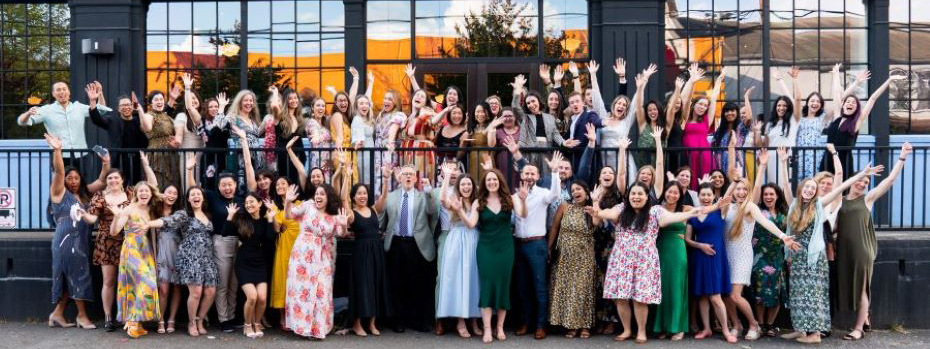
The department includes generalists, gynecologic oncologists, urogynecologists, reproductive endocrinologists, and maternal/fetal physicians.
OHSU nurse-midwives are available for referrals and work side-by-side with the residents in our clinics.
Residents also work with over 100 private practice physicians in the community who act as formal preceptors at the three other program sites.

The primary training site is OHSU Hospital and the OHSU Center for Women's Health, known as “The Hill,” which includes Doernbecher Children’s Hospital and the Veteran’s Administration Hospital.
Dr. Ian Fields oversees the activities of site directors at each of the hospitals where residents rotate off of the Hill. Each site director is responsible for day-to-day supervision and management of the individual resident rotations at the various teaching hospitals.
Dr. Julia Fehniger is the site director for our gynecologic oncology rotation at Legacy Good Samaritan.
Dr. Brenda Kehoe leads our Gyn and High Risk OB rotations at Legacy Emanuel.
Dr. Elizabeth Melendez is the site director for our obstetric and gynecology rotations with the Kaiser Permanente Northwest health system.
Dr. Virginia Leslie manages our clinical and educational experiences at Providence St. Vincent Medical Center and Virginia Garcia Memorial Health Center
Dr. Shira Saperstein manages resident training activities at Hillsboro Medical Center.
OHSU GME Benefits and Salary
The salary levels for residents/fellows for the 2023 - 2024 academic year are listed below. The biweekly salary is dependent upon the level of postgraduate training the resident/fellow has completed within the United States.
Training Level FY 24 Salary @ 1.0 FTE (Biweekly) FY 24 Salary @ 1.0 FTE (Annual)
PGY1 $2,546.36 $66,205.29
PGY2 $2,668.05 $69,369.37
PGY3 $2,794.10 $72,646.65
PGY4 $2,933.13 $76,261.29
Parking is limited on the university grounds. A space, however, is always assured for every resident/fellow who purchases parking. Parking is available at a reduced cost for residents/fellows and can be automatically deducted from paychecks before taxes are applied. Alternatively, TriMet passes for bus and light-rail services are provided at substantially reduced prices for residents/fellows.
House officers are provided with an annual housing stipend paid pro rata in the first two paychecks of every month. House officers are additionally granted up to $1000 in relocation funds accessible via reimbursement after hire date.
Wellness and Wellbeing
- Monthly Intern Wellness group lunch
- Wellness and Fitness Center membership available to residents
- Resident Faculty Wellness Program provides an array of services to increase clinician wellness and reduce burnout and distress, facilitating a strong and thriving workforce.
- 4 weeks of paid time off each year and 1 major holiday
- 4 half days per academic year for healthcare, dental, or personal needs
- Dental, Vision, and Health benefits available from day one
Educational Support
- Yearly stipend for educational supplies
- Reimbursement towards cost of USMLE Step 3 exam
- Support from House Officers Union
- Financial support and protected time when presenting posters or abstracts at national meetings
- 2-week elective rotation during 3nd year of residency
- Free registration and attendance to annual Pacific Northwest OBGYN Review
- Didactics every Friday from 9-12 on variety of topics, protected time for attendance
Curriculum
- Ultrasound curriculum in R1 and R2 year
- CREOG and Board prep review led by program faculty
- Weekly Grand Rounds and M&M
- Specialty Journal Clubs
- FP, MIS, Gyn Onc, MFM, REI, Urogyn
- Surgical skills and simulation every rotation
- Rotation based curriculum
- Research and evidence based medicine curriculum
- Improvement science curriculum with personal projects
Mission Statement
The mission of the Obstetrics and Gynecology Residency Program at Oregon Health & Science University is to develop outstanding physicians with the knowledge and skills to build productive and fulfilling careers as clinicians, educators, researchers and advocates. We strive to provide this training in a diverse, inclusive, collegial educational environment where trainee well-being and professional development are among our utmost priorities and in alignment with the University's triple aims of healing, teaching and discovery.
Program Aims
- Broadly train OBGYN residents to enter comprehensive, full scope obstetrics and gynecology practices or to continue on to competitive fellowship training.
- Produce graduates who become leaders in OBGYN and advocates for patients and their communities.
- Prepare residents within an innovative curriculum that emphasizes surgical excellence, academic rigor, professionalism, continual quality improvement and self-care.
The obstetrics and gynecology training program at OHSU combines structured teaching environments such as skills labs, observed and debriefed patient encounters, and didactics and journal clubs with busy clinical and operative services to fulfill the educational objectives outlined by the Council of Residency Education in Obstetrics and Gynecology (CREOG). Its outstanding faculty and superb clinical facilities provide a top-notch training program that prepares graduates to be competitive for fellowship positions or to be outstanding generalist OBGYN physicians. The key educational objectives include:
- Comprehensive exposure to the core curriculum in Obstetrics and Gynecology as outlined by CREOG.
- Education, assessment, and demonstration of competency in patient care, medical knowledge, communication skills, professionalism, practice-based learning and improvement, and systems-based practice.
- Development of complete proficiency in office gynecology, evaluation and management of all general gyn problems, performance of office gyn procedures including colposcopy, endometrial evaluation, and limited gyn ultrasound, and ability to function as a consultant in gynecology.
- Mastery of low- and high-risk obstetrical management in the ambulatory and inpatient settings, including performance of limited obstetrical ultrasound and exposure to genetics.
- Technical proficiency in basic and complicated gynecologic operative procedures, pre- and post-op evaluation, and management of complications.
- Training in primary care, including the use of complementary and alternative medicine, in order to address the total healthcare needs of women.
- Training in menopause management and geriatrics, with an emphasis on the special needs of an increasing geriatric population.
- Proficiency in first and second trimester abortion, follow up care, and complications. See Abortion Policy.
- Exposure to reproductive endocrinologic, urogynecologic, and gynecologic oncologic evaluation, surgical care, and postoperative care, as well as medical management unique to these patient populations.
- Proficiency in the analysis and interpretation of medical literature and epidemiology, and the use of electronic media to gather current publications and research.
- Exposure to basic and clinical research in obstetrics and gynecology, including experience creating, analyzing, interpreting, and presenting original research in women’s health.
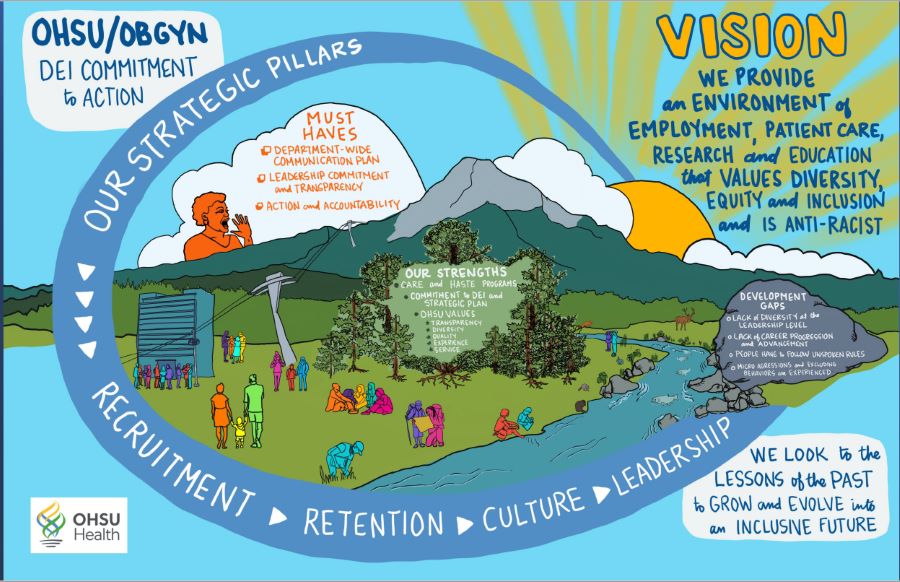
In addition to our hospital-wide diversity and inclusion efforts, our Obstetrics and Gynecology program is proud to host a Resident Diversity Committee which meets quarterly, a quarterly book club focused on works by marginalized authors, an anti-racism library, and department wide Health Advocacy, System Transformation, and Equity (HASTE) Committee, and more DEI efforts with many chances for resident involvement. Our committees have formed to identify opportunities at the trainee level to eliminate bias, develop policies for departmental research to serve anti-racist goals, and develop QI projects to evaluate for bias in our treatment of patients. Journal Clubs are held during Grand Rounds 2-4 times per year with articles selected to facilitate discussions on anti-racism.
OBGYN DEI Vision Statement: We provide an environment of employment, patient care, research, and education that values diversity, equity and inclusion that is anti-racist.
Vice Chair for Diversity, Equity and Inclusion - Amanda Bruegl, M.D., M.C.R.
Amanda is a citizen of Oneida Nation (a tribe in Wisconsin), a gynecologic oncologist, and passionate researcher to reduce cervical cancer disparities among American Indian/Alaska Native and rural people.
DEI Program Manager – Mónica Rincón, MD, MCR
Monica is from Colombia with an “O”, an OB generalist interested from the beginning in voicing the Spanish speakers experiences and improving services not only from the research perspective.
DEI Project Coordinator - Morinne Osborne, BS
Morinne is a Portland native, facilitating the Women’s Health Research Unit’s Bias training that promotes social justice awareness and discussion related to equity and inclusion.
Programs, Projects and Opportunities:
- Longbridge Collective (LBC) consulting group was hired by the department in 2021 to aid in our DEI mission and facilitated our 2nd annual DEI Retreat in February 2022.
- Annual DEI retreat: in person (with virtual option) opening with a keynote speaker with additional activities to share departmental progress, develop future action items/solutions, and foster collaborations
- Education for all members in the department
- Grand rounds
- Newsletters
- Book and Media Club
- Trauma-Informed Care sessions
- Creating awareness in our practice, interactions with trainees/colleagues, and ourselves
- Community opportunities that staff, providers, and health professionals could attend; information distributed through email monthly
- Department faculty in OHSU committees
- Building inclusive and diverse teams
- CARE (Creating An Anti-Racist Environment) and HASTE (Health Advocacy System
- Transformation and Equity) Committees
- Subcommittees for all members in the department to participate and grow together
- Educational professional/faculty development
- Unconscious Bias and Anti-Racism training requirement (options for modules and training) - composition and Training of Admissions Committees
- Foster Respectful and Equitable Education (FREE) – Difficult conversation series
- National Health Equity Grand Rounds
- AAMC IDEAS webinars to foster inclusive environments and create and promote equitable, antiracist policies, education, and institutional practices
- Diversity Mentorship Program – mentoring medical students of diverse or underrepresented backgrounds
OHSU:
- Covington Report: OHSU hired an external consulting group that conducted an eight-month investigation into OHSU’s institutional culture to provide a transparent avenue to create meaningful change at OHSU
- Gender Equity in Academic Health and Medicine - address issues important to women and gender diverse individuals across OHSU
- L&D – culture improvement project manager
- Meets with RN managers weekly and L&D director monthly to address communication and cultural community on the units
- Center for Diversity and Inclusion
- Executive Vice President and Chief People Officer - Qiana Williams, Ed.S., ACC, SPHR, SHRM-SCP
- Office of Civil Rights Investigations and Compliance (OCIC) Developing central system for required reporting
- Support Service and Reporting for Harassment, Discrimination or Retaliation
School of Medicine Diversity Equity and Inclusion
• School of Medicine DEI Strategic Plan
• Resources
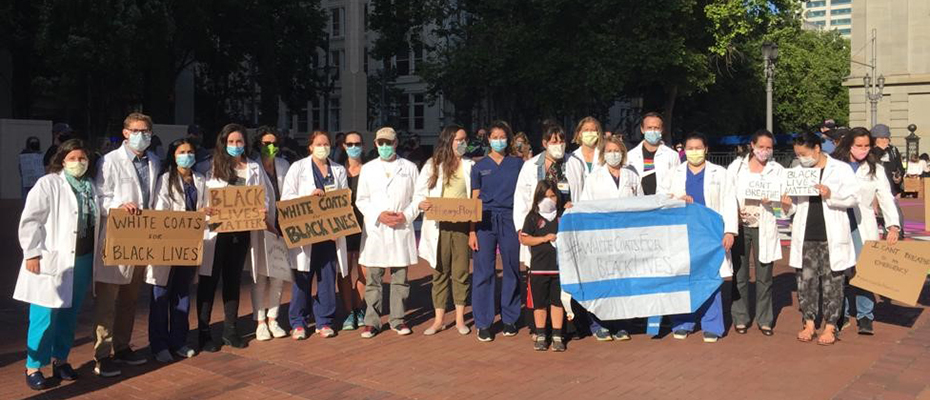
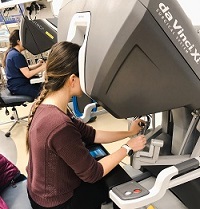
The focus of our Simulation Lab is to train learners in technical skills, invasive procedures, and clinical anatomy. OHSU's two simulation labs provide a range of capacities that supports training across the OB/GYN curriculum and advanced professional training.
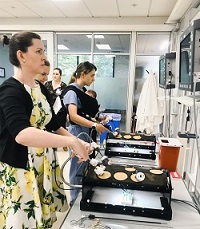
We are proud to offer our residents High Fidelity Obstetrics Simulations in a dedicated SIM lab. Every Fall our residents have a full day of OB Emergency Simulation. We also host monthly interdisciplinary emergency simulation on L&D.
Our simulation lab will prepare our residents with rotation based OB skills sessions including forcep and vacuum assist, C/S, manual rotation, breech delivery and more.
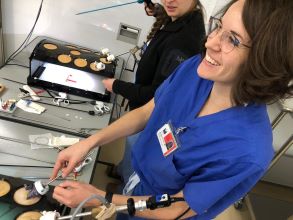
- Annual cadaver and porcine lab
- Rotation based surgical skills session
- Basics of suturing, knot tying, electrocautery, etc
- Hysterectomy , D&C, hysteroscopy, circumcision
- Laparoscopic trainer and curriculum
- Testing tracks progression and identify issues
- Open to residents at all hours, staff available to assist
- Robotics training curriculum